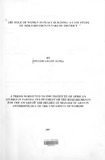| dc.description.abstract | The resurgence of conflicts in many parts of Africa including Sudan, Somalia, Burundi, Kenya
and elsewhere has mired efforts to build sustainable peace in Africa. This has caused untold
suffering particularly among civilian populations with women and children bearing the brunt of
these conflicts. Although women have made an important contribution in peace building, they are
consistently excluded in formal peace negotiations. This is because politicians and peace
practitioners have viewed women primarily as 'victims' in conflict situations with little or
nothing to contribute to peace efforts. This has obscured the actual contribution of women to
peace efforts. The Beijing Platform of Action spells out that there should be equal participation of
women and men at all levels of decision making including peace building. In this regard, the
study examines the role of women in peace building using qualitative and quantitative methods of
data collection.
The study was conducted in two locations in Molo division using different methods of data
collection. The sample was drawn by purposive and snowball sampling methods and respondents
were interviewed using questionnaires with open and closed ended questions. In depth qualitative
data were obtained through key informant interviews, focus group discussions and narratives.
The data were analyzed quantitatively and qualitatively. Gender perspective and Capacities and
Vulnerabilities Analysis were used in the interpretation of research findings.
The study established that several values and institutions that were central to a culture of peace in
traditional African societies have been eroded. These include the critical role of women as peace
educators in the family and values such as patience, tolerance, humility, respect and sympathy.
Their erosion has caused setbacks in modern women's efforts to build peace as they do not
sufficiently embody the values that maintained peace and harmony in traditional societies.
Contemporary women do not also sufficiently perform their role as peace educators. The study
proposes that these values and institutions be reinstated for the promotion of sustainable peace in
current societies.
The study established that women are actively involved in informal peace building initiatives.
However, attitudinal and structural barriers hinder them from actively participating in formal
peace building efforts. The study proposes that targets be established for the number of women
participating in peace negotiations and that education and training opportunities be made
accessible to women to enable them to participate actively in formal peace building efforts.
The study revealed that women and men possess unique strengths for peace building which they
acquire through the socialization process that prepares them to perform their traditional gender
roles. The findings show that women and men approach conflict differently, have different
concerns and use different strategies in the building of peace. Women's perception of peace is
broad and includes agendas that lead to improvements in the overall quality of life. Women are
also more likely than men to embrace a collaborative position that cuts across ethnic, class or
religion which contributes to breaking down barriers. Furthermore, women are the mam
proponents of gender in peace negotiations. On the basis of these findings, the study
recommends procedures to tap the experiences, strengths and expertise of women for building
sustainable peace. In addition, the study proposes measures to address the physical, social and
motivational vulnerabilities of people affected by conflict in a sustainable way.
The study findings revealed that the impact of women's peace efforts is felt more in current
settings than in traditional settings. The increased involvement of women in formal peace
building initiatives has enabled women to challenge human rights violations against women and
to propose laws that safeguard women's rights. Women have achieved a lot by organizing in
groups that cut across socio-cultural barriers. The peace contributions of women have changed
perceptions about women's leadership role, contributed to a more equitable society and improved
the overall quality of life.
The participation of women should not be viewed as beneficial to women alone but as crucial in
the search for sustainable peace. The study shows that excluding women from peace processes
entrenches their vulnerability which threatens the realization of lasting peace and can contribute
to future conflicts. It further draws attention to alternative forms of peace building in the informal
sphere. These efforts by women should be recognized and strengthened to complement peace
efforts in the formal sphere. The study also reveals that women are disproportionately affected by
conflicts but are agents in the making of both war and peace. Finally, the study suggests that
peace building should include equal participation of men and women and collaboration among all
the sectors of peace building. | en |

